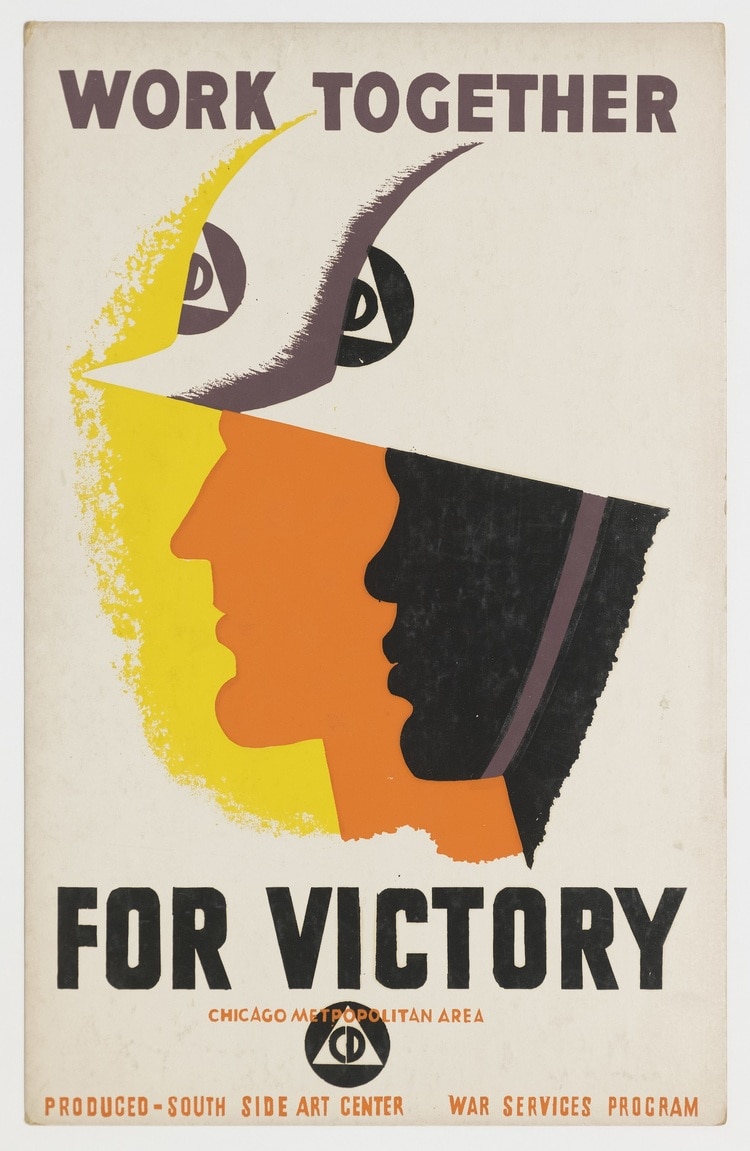- November 2-3, 2018
The Designs of African American Life
Chicago Cultural Center
78 East Washington Street, Chicago, Illinois 60602

Unknown designer, Together for Victory, c. 1942. Silkscreen ink on board, c. 1942. William McBride Papers, Vivian G. Harsh Research Collection of Afro-American History and Literature, Chicago Public Library. James Prinz Photography, Chicago.
NOTICE OF CANCELLATION—Due to unforeseen circumstances, the keynote address on Friday, November 2 featuring Jackie Goldsby is cancelled. We apologize for any inconvenience. Please join us instead for curator-led tours of the exhibition African American Designers in Chicago: Art, Commerce and the Politics of Race at the Chicago Cultural Center from 5 to 6 PM followed by a reception in GAR Hall. The remainder of the symposium on Saturday, November 3 will continue as planned.
Where is design in the history of African American life? In many respects, it has been, and continues to be, everywhere. As artisans, mechanics, milliners, tailors, sign-painters, hair dressers, book makers, art directors, commercial photographers, architects, product engineers, and digital media specialists, African Americans have taken up design work and entered the design professions not only to earn a living but also to elevate the value of African American life over and against the racism that has devalued that life from the age of Atlantic slavery to our present moment of global capitalism. Yet, in several critical respects, we have only begun to reckon with design as a practice for African American life and as a mode for African American living.
Marking the opening of African American Designers in Chicago: Art, Commerce, and the Politics of Race, this symposium gathers scholars and design practitioners who address all aspects of design in African American life. While the exhibition celebrates the works of Chicago-based graphic artists in fields ranging from sign-painting to doll-making, the symposium goes beyond Chicago and beyond the graphic arts in order to take stock of current work in the field and to explore new directions for research and practice. As they advance new narratives and methodologies that grasp the history of African American design, speakers illuminate critical problems at the intersection of art, politics, and everyday life.
The symposium features presentations by Elspeth Brown (University of Toronto), Jason Chambers (University of Illinois—Urbana-Champaign), Romi Crawford (School of the Art Institute of Chicago), Joshua Clark Davis (University of Baltimore), Michelle Fisher (Philadelphia Art Museum/City University of New York), Brenna Greer (Wellesley College), Kinohi Nishikawa (Princeton University), and Michelle Joan Wilkinson (National Museum of African American History and Culture).
Friday, November 2
- 5–6 p.m. Welcome
- Join co-curators Chris Dingwall and Daniel Shulman for tours of the exhibition African American Designers in Chicago: Art, Commerce, and the Politics of Race.
- 6:30–8:30 p.m. Reception
Saturday, November 3, 2018
- 9:30–10:30 a.m. Panel 1: Print and Power
“Black Cheesecake: Johnson Publishing and the Marketing of Female Sexuality,” Brenna Greer, Wellesley College
“Black Bookstores and the Design of Black Power,” Joshua Clark Davis, University of Baltimore
- 10:45 a.m.–11:45 p.m. Panel 2: Commerce and Community
“Liberation Art or Just Advertising?: African American Commercial Artists in the 1960s and 70s,” Jason Chambers, University of Illinois
“Herbert Temple and the Black Arts Movement,” Kinohi Nishikawa, Princeton University
- 11:45 a.m.–1 p.m. Lunch
- 1–2 p.m. Panel 3: Aesthetics and Being
“Modeling across the Color Line,” Elspeth Brown, University of Toronto
“Art and Being-ness: Black Vernacular Design and Aesthetics on Chicago's South Side, 1968-73,” Romi Crawford, School of the Art Institute of Chicago
- 2:15–3:15 p.m. Panel 4: Canons and Archives
“Hidden in Plain Sight: Charles Harrison and the Canon of Twentieth Century Design History,” Michelle Millar Fisher, Philadelphia Museum of Art and the Graduate Center at the City University of New York
“Collecting Design for the National Museum of African American History and Culture,” Michelle Joan Wilkinson, Smithsonian Institution
- 3:30–4:30 p.m. Closing Keynote: “Craft/Freedom: Regarding the Value(s) of African American Design,” Adam Green, University of Chicago
Adam Green's closing presentation focuses on the history of the Black craftsman/woman in order to suggest how we can see mechanical, practical, and imaginative dimensions of Black design, broadly considered, as formulation and exercise of Black freedom, against the American tendency to deny African American independence as a rule.